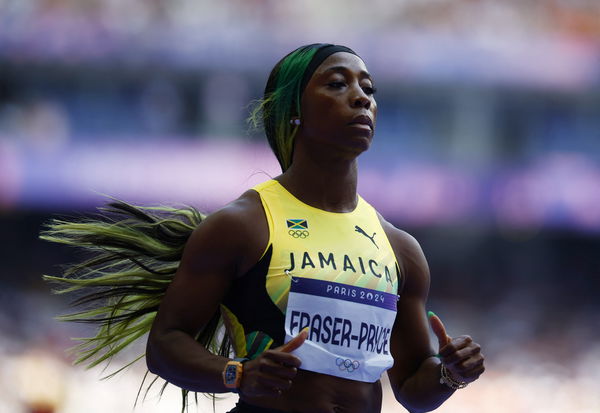
via Reuters
Paris 2024 Olympics – Athletics – Women’s 100m Round 1 – Stade de France, Saint-Denis, France – August 02, 2024. Shelly-Ann Fraser-Pryce of Jamaica reacts after the heats. REUTERS/Sarah Meyssonnier

via Reuters
Paris 2024 Olympics – Athletics – Women’s 100m Round 1 – Stade de France, Saint-Denis, France – August 02, 2024. Shelly-Ann Fraser-Pryce of Jamaica reacts after the heats. REUTERS/Sarah Meyssonnier
For a country long synonymous with sprinting brilliance, Jamaica now finds itself facing a crisis not of form but of allegiance. In recent weeks, a quiet storm has erupted into a full-blown reckoning, as some of the nation’s finest field athletes—Olympic medalists and prodigies alike—have opted to represent Turkey. The headlines were as disorienting as they were swift: discus champion Rojé Stona, shot putter Rajindra Campbell, triple jump prodigy Jaydon Hibbert, and long jumper Wayne Pinnock, all gone in the span of days. While speculation circled a reported $500,000 incentive from Turkey, a growing chorus of voices back home suggested something deeper at play. And now, one of Shelly-Ann Fraser-Pryce’s teammates has broken her silence, drawing a sharp line between public admiration and institutional neglect.
Shanieka Ricketts, Jamaica’s seasoned triple jumper and a silver medalist at both the World Championships and the Olympics, recently claimed her seventh national title at the Jamaica National Championships. But behind her measured celebration was a pointed reminder that the success of Jamaica’s field athletes rests not only on talent, but on fragile support systems. Speaking after her victory, Ricketts confirmed a new local sponsorship deal—her first of its kind—but used the moment not to promote herself, but to call attention to the broader lack of investment in athletes like her.
“This is my first local sponsorship and I hope that that will inspire other corporate companies to come on board and to support our field event athletes, because as you see we’re doing exceptionally well and I’m just excited to see what comes from that,” Ricketts stated. Her comment, while brief, underscored a reality many have ignored: Jamaica’s field competitors are producing historic results but remain largely invisible to local backers. Despite the country’s continued Olympic relevance, it appears that only the track events enjoy consistent support, both structurally and commercially.
ADVERTISEMENT
Article continues below this ad
Ricketts’ performance in Kingston served as a timely reminder of her caliber. She held her nerve through early pressure from Akilah Smith, overtaking her in the fifth round to secure the national title once more. But her composure on the runway belies a deeper frustration shared by many of her contemporaries, particularly those now considering foreign flags. For athletes like Stona and Campbell, years of overlooked contributions and limited access to resources seem to have eroded any remaining sense of loyalty to the JAAA. Ricketts, who remains committed to Jamaica, nonetheless made it clear that good intentions are not enough. Results need backing.
AD
National champion, Shanieka Ricketts calls for other entities to sponsor Jamaican field event athletes. pic.twitter.com/X3sAL0VA5p
— Omilia Sports (@omiliasports) June 29, 2025
Her use of the word “extraordinary” to describe the season was apt, not just for the medals and podiums, but for the difficult questions it has forced into public view. As athletes depart and others speak out, the message is no longer subtle: Jamaica’s institutions must evolve or risk losing more than medals. They may lose the very foundation of their sporting legacy. While the Jamaican athletic world is struggling with such an issue today, Shelly-Ann Fraser Pryce has spoken about funding and equal pay years ago.
ADVERTISEMENT
Article continues below this ad
How Shelly-Ann Fraser-Pryce has been sprinting toward equal pay, and not applause
Few athletes navigate the intersection of excellence and advocacy with the composure and conviction of Shelly-Ann Fraser-Pryce. Her victories on the track are well documented, but her enduring effort to ensure equitable footing for sportswomen has distinguished her in a different arena, one where medals are not awarded, but respect is hard-won. Fraser-Pryce has never asked for reverence; she has demanded fairness. And in doing so, she has compelled a generation of athletes to consider their voice as potent as their stride.
What’s your perspective on:
Are Jamaican institutions failing their athletes, or is the allure of foreign incentives too strong?
Have an interesting take?

via Imago
World Athletics Championships Budapest 23 Hungary, 26.08.2023 Shelly-Ann FRASER-PRYCE of JAMAICA JAM at the World Athletics Championships Budapest 23 in Budapest, National Athletics Centre, on Saturday, 26. August 2023 *** World Athletics Championships Budapest 23 Hungary, 26 08 2023 Shelly Ann FRASER PRYCE of JAMAICA JAM at the World Athletics Championships Budapest 23 in Budapest, National Athletics Centre, on Saturday, 26 August 2023. Copyright: xBEAUTIFULxSPORTS/TobiasxLacknerx
At the Laureus World Sports Awards in Paris, where she accepted the World Sportswoman of the Year honor, Fraser-Pryce made no detour around her purpose. With clarity and intent, she addressed the young women watching. She stated, “There are no barriers to your passion and your calling, as time honors your greatness.” While the remark was crafted for the girls of her Pocket Rocket Foundation, it was also a quiet indictment of structures that have, for decades, failed to offer female athletes the same economic recognition as their male counterparts. Fraser-Pryce has long spoken about the need for equity in sport, not as a future ideal, but as an overdue correction.
ADVERTISEMENT
Article continues below this ad
The Jamaican sprinter’s campaign for equal pay is not performative; it is persistent. She has consistently leveraged her stature not only to highlight disparities but to shift the conversation within federations, sponsorship circles, and governing bodies. Her message is rooted not in grievance but in responsibility. “Our influence in the world around us can be more significant than any of us imagine today,” she added. Fraser-Pryce’s stance is not symbolic. It is a practical, continuous act of representation, intervention, and, ultimately, transformation.
ADVERTISEMENT
ADVERTISEMENT
ADVERTISEMENT
ADVERTISEMENT


"Are Jamaican institutions failing their athletes, or is the allure of foreign incentives too strong?"